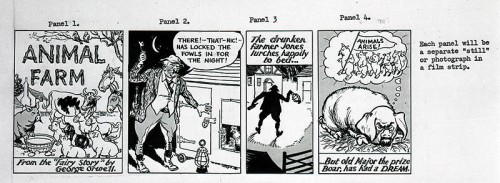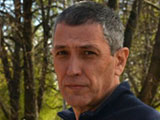Orwell’s 1984 and Totalitarianism, Pt. II: Embittered
by Israel Centeno and translated by Kelly Harrison / December 4, 2012 / No comments
The disillusioned author begins his masterworks.

Animal Farm Cartoon Strip by Norman Pett and Donald Freeman. The British Foreign Office commissioned this strip in 1950 and encouraged countries to publish it in their newspapers. UK National Archives. Via Wikimedia Commons.
Below is part two in a short series of articles concerning George Orwell’s Nineteen Eighty-Four and Animal Farm, two paradigmatic novels that address the issue of a future without freedom, from subtle dictatorships to totalitarianism. Read part one here.
After the Spanish Civil War—a testing ground for Stalinist totalitarianism and National Socialism—Orwell may have created the story lines for what would be his two dystopian literary works: Animal Farm and Nineteen Eighty-Four.

- From his lonely watch post Albert Camus asked who among us has not experienced exile yet still managed to preserve a spark of fire in their soul. “We’re all alone,” Natalia Sedova cried in exile on hearing of her husband Leon Trotsky’s affair with Frida Kahlo. In his novel Night Watch, Stephen Koch follows the incestuous love affair of David and Harriet, wealthy siblings watching the world from their solitary exile. Koch’s writing, Camus’s theories, and Trotsky’s affair all come back to exile and lead me to reflect on the human condition. From my own vantage point, my Night Watch, I will reflect on my questions of exile, writing, and the human condition.

- Israel Centeno was born in 1958 in Caracas, Venezuela, and currently lives in Pittsburgh as a Writer-in-Residence with City of Asylum/Pittsburgh. He writes both novels and short stories, and also works as an editor and professor of literature. He has published nine books in Venezuela and three in Spain.
Animal Farm, published in 1945, is a fable: A group of animals revolt and evict their farmer in order to manage the farm themselves in a parody of Stalinist communism. We can see, for example, that Old Major, the boar, represents Lenin, who, before he dies, shows the animals the path that must be followed so they can be freed from the yoke of humans. His heirs, Napoleon (Stalin) and Snowball (Trotsky) struggle for control of the farm. This story sets the progressive degradation of revolutionary ideals before the reader. At the time, it was difficult to find a publisher for the book, as it was written between 1943 and 1945; years in which the alliance with the Soviet Union was important for the West, given that they played a defining role in the war against Nazi Germany. This led the author to bitterly express: “Any serious criticism of the Soviet régime, any disclosure of facts which the Soviet government would prefer to keep hidden, is next door to unprintable. […] For though you are not allowed to criticize the Soviet government, at least you are reasonably free to criticize our own. Hardly anyone will print an attack on Stalin, but it is quite safe to attack Churchill, at any rate in books and periodicals.”
It was this Orwell, who was deceived, embittered, ostracized, and subjected to paradoxical censorship, who had lost his wife and was increasingly weakened from tuberculosis, who conceived Nineteen Eighty-Four, the most famous dystopian novel of them all.
In Nineteen Eighty-Four, the world is divided into three great superstates: Oceania, Eurasia, and Eastasia. Oceania comprises the Americas, Australasia, Great Britain, and southern Africa. Eurasia was created through the expansion of the Soviet Union across Europe. Eastasia consists of China, Japan, and Indo-China. The world fights a never-ending war, the three powers battling one another in an ever-changing situation of alliances and hostilities. At the beginning of the novel, Oceania is at war with Eurasia, it has always been at war with Eurasia, and it is allied with Eastasia. By the end of the book, the opposite is true. The novel also recounts the life of Winston Smith, a civil servant in the Records Department of the Ministry of Truth, the body responsible for falsifying reality and manipulating public opinion. Smith is an insignificant clerk for the all-powerful Outer Party. While separated and kept distant from members of the Inner Party, the true elite, and led by the omnipotent Big Brother, Smith is in a higher social class than “the Proles.”
Look for part three of Israel Centeno’s series on George Orwell on December 4.




